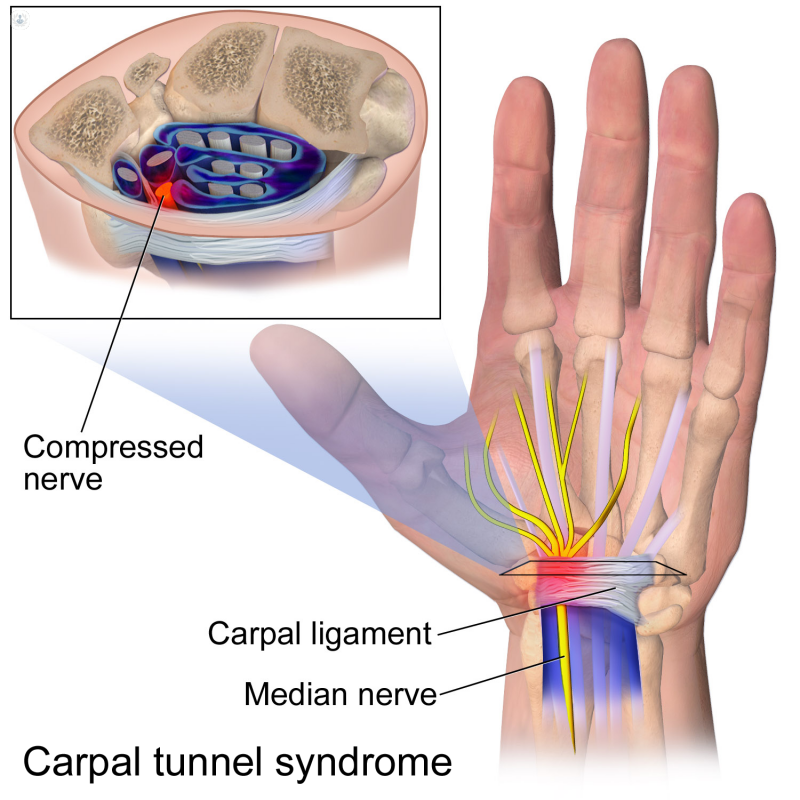Hand pain at night? Carpal tunnel syndrome explained
Escrito por:Do you get pain in your hands at night? Are you finding it harder to grip things? Does it sometimes feel like your fingers have swollen up like sausages? It’s natural to worry that you might seeing the beginning of a condition such as arthritis, but these symptoms could indicate a common nerve condition called carpal tunnel syndrome. Ms Anna Moon, experienced orthopaedic surgeon, is here to explain what carpal tunnel syndrome is, what causes it, and when you should seek medical help.

What is carpal tunnel syndrome?
Carpal tunnel syndrome is a condition where a nerve in the wrist called the median nerve gets compressed. Because this nerve controls the function and sensation of most of the fingers in your hand, compression of the nerve can cause pain, numbness, and even weakness in your grip.
The symptoms usually start as pins and needles, but over time, you might experience:
- pain spreading from the wrist to the forearm, and a sense of heaviness in your arms
- a feeling of swelling in your fingers, even if they don’t look swollen
- clumsiness, difficulty picking things up, or being unsure about whether you’re really holding something
The fingers usually affected are the index, middle finger, thumb, and half of the ring finger. The little finger is usually not affected because it is innervated by a different nerve (the ulnar nerve).
In more severe cases, the pain might be so bad that it is keeping you up at night. This can be especially frustrating since many patients report that the pain is better during the day, but comes back whenever they stop to sit down and relax.
What causes carpal tunnel syndrome?
The exact cause of carpal tunnel syndrome is unknown. It’s a common condition, affecting 7-16% of people in the UK , and it tends to affect women more than men. This could be because the space in the carpal tunnel is smaller in women.
As well as this, having certain genes seems to increase your risk of developing the condition, and it usually runs in the family. It is also possible that carpal tunnel syndrome is linked with conditions such as diabetes and an underactive thyroid.
When should I go to the doctor?
Carpal tunnel syndrome is very unlikely to go away on its own without treatment. The longer you leave it, the more it can cause irreversible damage to the nerves in your hands. Eventually muscle wastage in the hand can occur, leaving your hand permanently weakened. Because of this it is important to see a doctor sooner rather than later.
How is carpal tunnel syndrome diagnosed?
Diagnosing carpal tunnel syndrome is difficult because there are many other conditions which can cause similar symptoms. Other possible conditions include:
- compression of the nerve in your neck (C- spine)
- neuropathy caused by diabetic neuropathy or idiopathic polyneuropathy
- medication, including anastrozole, a drug for breast cancer
- vitamin B12 deficiency
There’s no test which will reliably diagnose carpal tunnel syndrome – instead a clinical diagnosis is based on your history and an examination. Many GPs request nerve conduction studies, but these are not diagnostic because they could either be falsely positive or falsely negative. It is possible that you could be affected by carpal tunnel syndrome in addition to one of the conditions listed above. Given the difficulty of diagnosis, it is important to see a specialist.
How is carpal tunnel syndrome treated?
There are a number of ways to treat carpal tunnel syndrome.
The simplest solution, and one which is often effective on its own, is wearing a wrist splint. A wrist splint keeps your wrist straight, relieving pressure on the nerve. It is usually worn at night, when you are likely to bend your wrist while sleeping.
If you go to the doctor and are experiencing acute pain, you might be offered a steroid injection. This doesn’t cure the underlying condition, but it provides immediate pain relief for a period of time (around 3 months).
Finally, if a wrist splint isn’t working, carpal tunnel surgery is likely to be offered. This is a very quick procedure, involving just half an hour in the operating theatre, and it causes immediate pain relief. It is one of the safest operations available, and recovery from the procedure is usually fast, with the wound settling down after 3-4 days, and stitches removed within 2 weeks.
Ms Moon is an orthopaedic surgeon specialising in carpal tunnel syndrome. If you’re concerned about pain or numbness in your hands, book a consultation with Ms Moon now.



